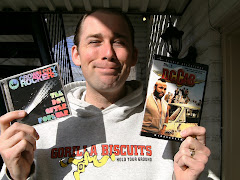
Kevin Kline is one of Hollywood’s most talented actors and Paul Dano is on his way towards becoming one as well. Both of these statements are wholly supported by their performances in The Extra Man, an enthralling feature from co-directors Robert Pulcini and Shari Springer Bergman (American Splendor). Set in present day New York, the film centers around two men who seem out of place in their time periods.
The first, Louis (Dano), is a young literature teacher and struggling writer who dreams of a life in the days of “The Great Gatsby” but copes with being stuck in the 21st century by throwing himself into books. Henry (Kline) is an unknown playwright and lower-level socialite who positions himself as Louis’ mentor when Louis rents a spare room in his apartment. His selfish motives are more than slightly obvious. While Henry gets along alright in the two-thousand-aughts, it’s his ideals which conflict with present day society. He’s an open sexist, racist, and classist whose opinions on just about everything, including literature, have been unpopular for decades.
Together, these two gentlemen impose themselves on New York’s upper class society, either by sneaking into the opera or performing favors in return for allowed attendance as gallery openings or fancy dinner parties. Henry teaches Louis about the life of an Extra Man (or “gigolo,” as they’re more commonly referred as) even though the young writer’s interests lie elsewhere, more specifically, in wearing women’s lingerie and dating an environmentalist (Katie Holmes).
The Extra Man certainly bears substance but where the film really stands out is in its style. It’s dripping in style; it oozes style, from the dress of the gentlemen to the bowl of shiny Christmas balls prominently displayed in their apartment’s living room. Everything to see in The Extra Man is a little bit different from everything you’ve ever seen before. The wallpaper, the city streets, they all contribute to this world where inhabitants are stuck between classes, stuck between ages, and at times, stuck in their own bodies. Even the film’s use of irises serves to speak to this notion of claustrophobia. And if the visuals weren’t enough, in keeping with his everyday struggle of not living within the pages of a classic novel, Louis has his very own narrator who dictates the inner thoughts of the film’s timid protagonist. Stylistically, Pulcini and Bergman left nothing up to chance and the result is a well-crafted film that’s thoroughly enjoyable and serves as a strong vehicle for the two exceptional performers.
Thursday, January 28, 2010
The Extra Man (Sundance Review)
Subscribe to:
Post Comments (Atom)














No comments:
Post a Comment